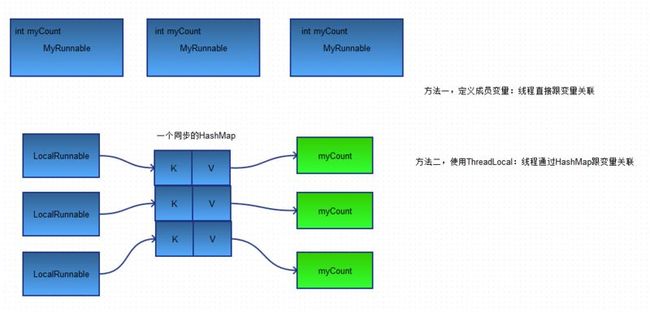理解ThreadLocal
原文链接:理解ThreadLocal
ThreadLocal是一个线程级别的局部变量,并非“本地线程”。ThreadLocal为每个使用该变量的线程提供了一个独立的变量副本,每个线程修改副本时不影响其它线程对象的副本。
下面是线程局部变量(ThreadLocal variables)的关键点:
1.一个线程局部变量(ThreadLocal variables)为每个线程方便地提供了一个单独的变量。
2.ThreadLocal实例通常作为静态的私有的(private static)字段出现在一个类中,这个类用来关联一个线程
3.当多个线程访问ThreadLocal实例时,每个线程维护ThreadLocal提供的独立的变量副本。
变量的作用域
class Foo {
public static int sn; // 全局变量
int i; // 成员变量, 对所有方法可见
void bar() {
int j; // 局部变量,对当前方法可见
}
}
以上代码中,sn, i, j有各自不同的作用域。可以满足不同的使用场景。
线程级别的局部变量
下面这段代码的功能是:若干个线程对一个整形变量进行累加, 检查累加结果是否为预期值(总的循环次数)。
public class UseThreadLocal {
static int count;
//synchronized
static void increment() {
count++;
}
/**
* 若干个线程对一个整形变量进行累加, 检查累加结果是否为预期值(循环次数)
* @param args
* @throws InterruptedException
*/
public static void main(String[] args) throws InterruptedException {
int[] loops = { 1000000, 1000, 10000, 1000000, 1000000 };
int num = loops.length;
Thread[] ts = new Thread[num];
long now = System.currentTimeMillis();
for (int i = 0; i < ts.length; i++) {
ts[i] = new Thread(new MyRunnable(loops[i]));
ts[i].start();
}
for (Thread thread : ts) {
thread.join();
}
long cost = System.currentTimeMillis() - now;
int sumOfLoops = 0;
for (int i = 0; i < loops.length; i++) {
sumOfLoops += loops[i];
}
System.out.println("cost=" + cost + " ms");
System.out.println("sumOfLoops=" + sumOfLoops + ",count="
+ UseThreadLocal.count);
System.out.println("sumOfLoops==count? "
+ (sumOfLoops == UseThreadLocal.count));
}
static class MyRunnable implements Runnable {
int loop;
public MyRunnable(int loop) {
super();
this.loop = loop;
}
@Override
public void run() {
for (int i = 0; i < loop; i++) {
UseThreadLocal.increment();
}
}
}
}
请注意其中的static void increment()方法。显然当我们去掉该方法的synchronized时,很可能得不到正确的预期值。而加上synchronized后,保证可以得到正确的预期值。
去掉synchronized,输出如下
cost=9 ms
sumOfLoops=3011000,count=2788360
sumOfLoops==count? false
加上synchronized,输出如下
cost=406 ms
sumOfLoops=3011000,count=3011000
sumOfLoops==count? true
除了关心预期值是否正确外,我们还应注意到性能上的差异。再次执行时间分别是9ms和406ms,可见同步方法的代价是巨大的!
假设这里有一种变量,是线程私有的、局部的,可以在当前线程上下文中自由操作(不需要同步),那我们就可以去掉synchronized并且保证程序结果是正确的。当然,可以直接在MyRunnable里面添加一个变量myCount,比如
static class MyRunnable implements Runnable {
int loop;
int myCount;
public MyRunnable(int loop) {
super();
this.loop = loop;
}
@Override
public void run() {
for (int i = 0; i < loop; i++) {
myCount++;
}
}
}
线程结束后再对每个线程的myCount求和。下面是用的另一种方式,即借助ThreadLocal来避免同步方法。
public class UseThreadLocal {
/**
* 计数器
*
*/
static class Counter {
static int count;
private static ThreadLocal<Integer> countLocal = new ThreadLocal<Integer>() {
protected Integer initialValue() {
return 0;
}
};
void increment() {
countLocal.set(countLocal.get() + 1);
}
int get() {
return countLocal.get();
}
synchronized void addToCount() {
count += get();
}
int getCount() {
return count;
}
}
/**
* 若干个线程对一个整形变量进行累加, 检查累加结果是否为预期值(循环次数)
* @param args
* @throws InterruptedException
*/
public static void main(String[] args) throws InterruptedException {
int[] loops = { 1000000, 1000, 10000, 1000000, 1000000 };
int num = loops.length;
Thread[] ts = new Thread[num];
Counter wrapper = new Counter();
long now = System.currentTimeMillis();
for (int i = 0; i < ts.length; i++) {
//ts[i] = new Thread(new MyRunnable(loops[i]));
ts[i] = new Thread(new LocalRunnable(loops[i], wrapper));
ts[i].start();
}
for (Thread thread : ts) {
thread.join();
}
long cost = System.currentTimeMillis() - now;
int sumOfLoops = 0;
for (int i = 0; i < loops.length; i++) {
sumOfLoops += loops[i];
}
System.out.println("cost=" + cost + " ms");
System.out.println("sumOfLoops=" + sumOfLoops + ",count="
+ wrapper.getCount());
System.out.println("sumOfLoops==count? "
+ (sumOfLoops == wrapper.getCount()));
}
static class LocalRunnable implements Runnable {
int loop;
Counter wrapper;
public LocalRunnable(int loop, Counter wrapper) {
super();
this.loop = loop;
this.wrapper = wrapper;
}
@Override
public void run() {
for (int i = 0; i < loop; i++) {
wrapper.increment();
}
// 这里仍然需要注意同步问题
wrapper.addToCount();
}
}
}
输出结果如下:
cost=81 ms
sumOfLoops=3011000,count=3011000
sumOfLoops==count? true
可以看到,不仅能保证结果正确,性能也比前面的同步方法有所提高。
ThreadLocal到底是什么
早在JDK 1.2的版本中就提供java.lang.ThreadLocal,ThreadLocal为解决多线程程序的并发问题提供了一种新的思路。使用这个工具类可以很简洁地编写出优美的多线程程序。
当使用ThreadLocal维护变量时,ThreadLocal为每个使用该变量的线程提供独立的变量副本,所以每一个线程都可以独立地改变自己的副本,而不会影响其它线程所对应的副本。
从线程的角度看,目标变量就象是线程的本地变量,这也是类名中“Local”所要表达的意思。
ThreadLocal的方法
该类的接口非常简单,只有4个方法。
- void set(T value)
设置当前线程的线程局部变量的值 - T get()
该方法返回当前线程所对应的线程局部变量 - void remove()
将当前线程局部变量的值删除 - T initialValue()
返回该线程局部变量的初始值。这个方法是一个延迟调用方法,在线程第1次调用get()或set(Object)时才执行,并且仅执行1次。ThreadLocal中的缺省实现直接返回一个null
如何实现ThreadLocal
下面是一个最简单的ThreadLocal。(JDK的实现也是类似思路)
public class SimpleThreadLocal {
private Map valueMap = Collections.synchronizedMap(new HashMap());
public void set(Object newValue) {
valueMap.put(Thread.currentThread(), newValue);//①键为线程对象,值为本线程的变量副本
}
public Object get() {
Thread currentThread = Thread.currentThread();
Object o = valueMap.get(currentThread);//②返回本线程对应的变量
if (o == null && !valueMap.containsKey(currentThread)) {//③如果在Map中不存在,放到Map中保存起来。
o = initialValue();
valueMap.put(currentThread, o);
}
return o;
}
public void remove() {
valueMap.remove(Thread.currentThread());
}
public Object initialValue() {
return null;
}
}
说白了,其实ThreadLocal目的不过是将线程跟线程不安全的数据关联起来。前面提到,可以在MyRunnable里面添加一个变量myCount,这是一种直接建立关联的办法。可以认为ThreadLocal是一种间接的方式。对比如下图 
在同步机制中,通过对象的锁机制保证同一时间只有一个线程访问变量。而ThreadLocal则从另一个角度来解决多线程的并发访问。ThreadLocal会为每一个线程提供一个独立的变量副本,从而隔离了多个线程对数据的访问冲突。因为每一个线程都拥有自己的变量副本,从而也就没有必要对该变量进行同步了。ThreadLocal提供了线程安全的共享对象,在编写多线程代码时,可以把不安全的变量封装进ThreadLocal。
概括起来说,对于多线程资源共享的问题,同步机制采用了“以时间换空间”的方式,而ThreadLocal采用了“以空间换时间”的方式。前者仅提供一份变量,让不同的线程排队访问,而后者为每一个线程都提供了一份变量,因此可以同时访问而互不影响。
使用场景
例1 使用线程相关的Connection
public class TopicDao {
private Connection conn;//①一个非线程安全的变量
public void addTopic() {
Statement stat = conn.createStatement();//②引用非线程安全变量
}
}
由于①处的conn是成员变量,因为addTopic()方法是非线程安全的,必须在使用时创建一个新TopicDao实例。 使用ThreadLocal对conn这个非线程安全的“状态”进行改造:
public class TopicDao {
//①使用ThreadLocal保存Connection变量
private static ThreadLocal connThreadLocal = new ThreadLocal();
public static Connection getConnection() {
//②如果connThreadLocal没有本线程对应的Connection创建一个新的Connection,
//并将其保存到线程本地变量中。
if (connThreadLocal.get() == null) {
Connection conn = ConnectionManager.getConnection();
connThreadLocal.set(conn);
return conn;
} else {
return connThreadLocal.get();//③直接返回线程本地变量
}
}
public void addTopic() {
//④从ThreadLocal中获取线程对应的Connection
Statement stat = getConnection().createStatement();
}
}
不同的线程在使用TopicDao时,先判断connThreadLocal.get()是否是null,如果是null,则说明当前线程还没有对应的Connection对象,这时创建一个Connection对象并添加到本地线程变量中;如果不为null,则说明当前的线程已经拥有了Connection对象,直接使用就可以了。这样,就保证了不同的线程使用线程相关的Connection,而不会使用其它线程的Connection。
例2 Handler所在线程必须有一个Looper
Android中一个线程中如果想要使用Handler,必须保证当前线程有一个关联的Looper。Handler的构造方法会调用Looper.myLooper()得到当前线程的Looper,如果为null则抛出RuntimeException。
public Handler(Callback callback, boolean async) {
if (FIND_POTENTIAL_LEAKS) {
final Class<? extends Handler> klass = getClass();
if ((klass.isAnonymousClass() || klass.isMemberClass() || klass.isLocalClass()) &&
(klass.getModifiers() & Modifier.STATIC) == 0) {
Log.w(TAG, "The following Handler class should be static or leaks might occur: " +
klass.getCanonicalName());
}
}
mLooper = Looper.myLooper();
if (mLooper == null) {
throw new RuntimeException(
"Can't create handler inside thread that has not called Looper.prepare()");
}
mQueue = mLooper.mQueue;
mCallback = callback;
mAsynchronous = async;
}
Looper代码如下。Looper.myLooper()方法中用到了ThreadLocal类。
public class Looper {
// sThreadLocal.get() will return null unless you've called prepare().
static final ThreadLocal<Looper> sThreadLocal = new ThreadLocal<Looper>();
/** Initialize the current thread as a looper.
* This gives you a chance to create handlers that then reference
* this looper, before actually starting the loop. Be sure to call
* {@link #loop()} after calling this method, and end it by calling
* {@link #quit()}.
*/
public static void prepare() {
prepare(true);
}
private static void prepare(boolean quitAllowed) {
if (sThreadLocal.get() != null) {
throw new RuntimeException("Only one Looper may be created per thread");
}
sThreadLocal.set(new Looper(quitAllowed));
}
/**
* Run the message queue in this thread. Be sure to call
* {@link #quit()} to end the loop.
*/
public static void loop() {
final Looper me = myLooper();
if (me == null) {
throw new RuntimeException("No Looper; Looper.prepare() wasn't called on this thread.");
}
final MessageQueue queue = me.mQueue;
for (;;) {
Message msg = queue.next(); // might block
if (msg == null) {
// No message indicates that the message queue is quitting.
return;
}
msg.target.dispatchMessage(msg);
msg.recycle();
}
}
/**
* Return the Looper object associated with the current thread. Returns
* null if the calling thread is not associated with a Looper.
*/
public static Looper myLooper() {
return sThreadLocal.get();
}
}